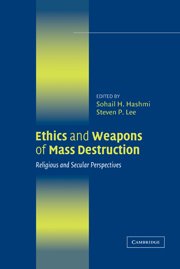Book contents
- Frontmatter
- Contents
- Tables and Figures
- Acknowledgments
- Abbreviations
- Ethics and Weapons of Mass Destruction
- Introduction
- 1 Weapons of Mass Destruction: A Brief Overview
- 2 The International Law Concerning Weapons of Mass Destruction
- PART ONE THE ORIGINAL DEBATE
- 3 Realist Perspectives on Ethical Norms and Weapons of Mass Destruction
- 4 Realism and Weapons of Mass Destruction: A Consequentialist Analysis
- 5 Natural Law and Weapons of Mass Destruction
- 6 War and Indeterminacy in Natural Law Thinking
- 7 Liberalism: The Impossibility of Justifying Weapons of Mass Destruction
- 8 A Liberal Perspective on Deterrence and Proliferation of Weapons of Mass Destruction
- 9 Christianity and Weapons of Mass Destruction
- 10 Christian Apocalypticism and Weapons of Mass Destruction
- PART TWO EXPANDING THE CONVERSATION
- PART THREE CRITICAL PERSPECTIVES
- Contributors
- Index
9 - Christianity and Weapons of Mass Destruction
Published online by Cambridge University Press: 05 June 2012
- Frontmatter
- Contents
- Tables and Figures
- Acknowledgments
- Abbreviations
- Ethics and Weapons of Mass Destruction
- Introduction
- 1 Weapons of Mass Destruction: A Brief Overview
- 2 The International Law Concerning Weapons of Mass Destruction
- PART ONE THE ORIGINAL DEBATE
- 3 Realist Perspectives on Ethical Norms and Weapons of Mass Destruction
- 4 Realism and Weapons of Mass Destruction: A Consequentialist Analysis
- 5 Natural Law and Weapons of Mass Destruction
- 6 War and Indeterminacy in Natural Law Thinking
- 7 Liberalism: The Impossibility of Justifying Weapons of Mass Destruction
- 8 A Liberal Perspective on Deterrence and Proliferation of Weapons of Mass Destruction
- 9 Christianity and Weapons of Mass Destruction
- 10 Christian Apocalypticism and Weapons of Mass Destruction
- PART TWO EXPANDING THE CONVERSATION
- PART THREE CRITICAL PERSPECTIVES
- Contributors
- Index
Summary
It cannot be said that earliest Christianity was pacifist. Certainly, Christians were criticized in the second century a.d. for abstaining from military service, and there is no record of any Christian author of the period approving of participation in battle. However, since Christians were subject to intermittent persecution by the state until the early fourth century, it is difficult to say whether their military abstinence was a result of moral principle or political alienation. And while in the third and fourth centuries some theologians expressly condemned military service on the part of Christians, this in itself could be taken to suggest a Christian presence in the army; and other evidence indicates that such a presence was growing from the end of the second century onward.
Following the conversion of the emperor Constantine in a.d. 312, and Christianity's subsequent toleration and gradual privileging, Christian participation in public office increased – and with it the need to reckon with the (tragic) necessity of using force to maintain the good of public peace and to assert the good of justice. Augustine (354–430), bishop of Hippo in North Africa, was one of the earliest to develop a rationale for the Christian use of force, and it is mainly from him that the Christian theory of “just war” stems.
- Type
- Chapter
- Information
- Ethics and Weapons of Mass DestructionReligious and Secular Perspectives, pp. 168 - 199Publisher: Cambridge University PressPrint publication year: 2004
- 1
- Cited by



